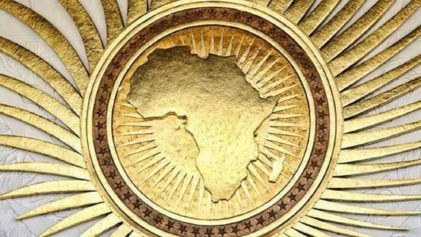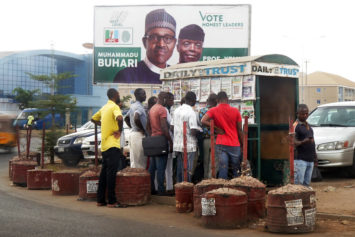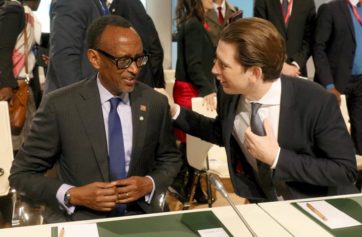Is the world witnessing the makings of the United States of Africa? The African Union has taken a step toward integration of the continent. At its summit taking place in Kigali, Rwanda in July, the AU is launching a single, common electronic passport throughout the continent.
The 54-member body wants to allow free movement across national borders in Africa, creating “seamless borders” similar to the EU Schengen free movement deal, as The Independent reported. The AU plans to have visa-free travel for Africans visiting African countries by 2020, and will enact a free-trade agreement by next year.
The first group to receive the new passport in July includes AU heads of state and government, foreign affairs ministers, and the permanent representatives of AU member states based at the AU headquarters in Addis Ababa, Ethiopia.
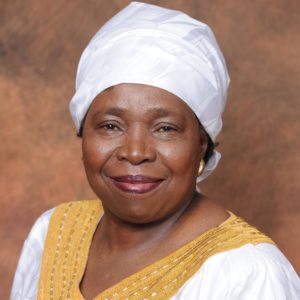
Dr. Nkosazana Dlamini Zuma, the Chairperson of the African Union Commission (AUC)
Dr. Nkosazana Dlamini Zuma, the Chairperson of the African Union Commission, has called the initiative symbolic and significant, and in a press statement said it is a “steady step toward the objective of creating a strong, prosperous and integrated Africa, driven by its own citizens and capable of taking its rightful place on the world stage.”
“I think on balance this is very positive, and one of the things that has become very obvious on the continent is two major crises,” Bill Fletcher Jr. — former president of TransAfrica Forum, host of “Arise” on WPFW and Senior Scholar with the Institute for Policy Studies — told Atlanta Black Star. “One is around migration and the other is money. And the AU needs to intervene on both. The illicit trafficking around money and the ability of people to move from country to country, that needs to be tied to a continental educational initiative,” he said. “When you see what happened in South Africa, it whips up into a right-wing populist cause, and it is very dangerous.”
The notion of a united Africa is by no means a new idea. Rather it is the stuff of folklore. Marcus Garvey spoke of the concept in his poem entitled “Hail! United States of Africa:”
Hail! United States of Africa-free!
Hail! Motherland most bright, divinely fair!
State in perfect sisterhood united,
Born of truth; mighty thou shalt ever be…
Bob Marley even wrote a song called “Africa Unite”:
…Africa unite:
‘Cause we’re moving right out of Babylon,
And we’re going to our Father’s land, yea-ea.
How good and how pleasant it would be before God and man, yea-eah! –
To see the unification of all Africans, yeah! –
As it’s been said a’ready, let it be done, yeah!
We are the children of the Rastaman;
We are the children of the Iyaman.
Fletcher also noted that while in the 1950s the dream of a united Africa did not incorporate a common political or economic approach, things have changed.
“First of all, the intention of the decision is something that has been in the works, almost since the start of the conversion of the OAU [Organization of African Unity] to the African Union, so that is not surprising,” Reuben E. Brigety II, Dean of the Elliott School of International Affairs at George Washington University and Adjunct Senior Fellow for African Peace and Security Issues at the Council on Foreign Relations, told Atlanta Black Star. “This is not something that was clearly just decided or came out of the last summit. They have been on the move toward the idea of a single African passport, free movement of people, etc., for several years,” said Brigety, who served under President Obama as the appointed Representative of the United States of America to the African Union and Permanent Representative of the United States to the UN Economic Commission for Africa.
According to Ambassador Brigety, the real question is with regard to the AU plan in its implementation.
“Regrettably the Union, particularly the Assembly of Heads of State, is really quite famous, or has a track record of making pronouncements and decisions that often take a long time from implementation, if ever. For example, think about the decision that was taken two years ago by the Assembly of Heads of State to move toward the African Union financing itself as opposed to relying so heavily on donors. The implementation of that decision has been really hard without the actual steps necessary to actually make that more of a reality. They have promised to do so within five years now, and we will simply have to see. And I think that the same is true with regard to the creation of a single African passport as well as moving towards a true continental-wide, free-trade area,” Brigety added.
“So if they were able to do both, certainly on matters of continental free trade, it would create economies of scale for investment from non-African foreign direct investment, which could potentially be transformative for the continent,” Brigety said of the AU passport and free-trade plans. “One would presume that also it would boost inter-Africa trade as well by cutting down on trade barriers, etc. But this is even if one accepts on face value the intent behind the decision.
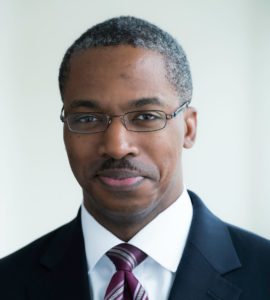
Reuben E. Brigety II (Photo: Council on Foreign Relations)
Brigety noted the enormous complexities of implementing such a scheme.
“On the common passport, for example, the free movement of peoples, we’re seeing the challenges that Europe is having with that right now, and not only with regard to the migrant question, the Syrian refugee question, Syrian and Afghan and other refugees flooding in. This was a problem beforehand, with large numbers of Eastern Europeans from the eastern part of the European Union moving to go to the U.K. and Germany and France, etc., to find employment. I think it’s one of the things that is obviously motivating the Brexit question,” he said. “One could certainly see the movement of, say, Somalis to South Africa legally under a free African passport, or for Congolese to Senegal, or anything else like that that would have similar kinds of pressures that will have to be dealt with within the African context,” Brigety argued. “On balance if they can get it right, the upside will probably be greater than the downside. But the questions of implementation are profound as well as some of the political questions that will inevitably follow this kind of next step towards integration.”
Another concern with the notion of seamless borders is the specter of terrorism.
“It’s obviously crucially important that if you allow the free movement of people that the governments of the Union have a sense of who actually is moving. I would say that that is a problem anyway, even with 54, 55 individual national passports,” Brigety argued. “It’s a problem because of the large ungoverned spaces across the continent…and it will be moreso if one assumes the AU has a common African passport and [Africans] can move at will. But my point is that this would be an issue even if one did not move towards a common African passport. And the countries are going to try to figure out if they presume that the upside of free movement of people for economic and political purposes is greater than the downside of security challenges. They have to figure out how to deal with security challenges,” he added.
This latest e-passport project falls within the framework of Africa’s Agenda 2063. That agenda has the following seven African Aspirations:
-
A prosperous Africa, based on inclusive growth and sustainable development
-
An integrated continent, politically united, based on the ideals of Pan Africanism and the vision of Africa’s Renaissance
-
An Africa of good governance, democracy, respect for human rights, justice and the rule of law
-
A peaceful and secure Africa
-
Africa with a strong cultural identity, common heritage, values and ethics
-
An Africa whose development is people driven, relying on the potential offered by people, especially its women and youth, and caring for children
-
An Africa as a strong, united and influential global player and partner
Aspirations 2 and 7, which speak of an “integrated” and “unified” continent, are reflected in the passport initiative, the goal of which is “facilitating free movement of persons, goods and services around the continent — in order to foster intra-Africa trade, integration and socio-economic development,” according to the AU.
“Build capacity, interact with yourselves. #Agenda2063 will not succeed without collaboration with partners.” Dr. Chilengi #mwfcon16
— U.S. Embassy Nairobi (@USEmbassyKenya) June 15, 2016
Asps 2&7 of #Agenda2063 envision an #Africa integrated & united. A Common African Passport seeks to realise this https://t.co/w1g9FtH0z3
— CCPAU (@Citizens4Africa) June 20, 2016
#Africa, If I don’t need a passport to go from NewYork to Ohio, why should I need one to go from #Ghana to #Nigeria? #OneAfrica
— USAfricaNow (@USAfricaNow) June 22, 2016
According to Brigety, free trade on the African continent “certainly creates greater opportunities for individuals and corporations that are interested in investing.” He used the example of someone establishing a textile business in Africa.
“As opposed to having to cross a half dozen different countries to move textiles from, say, South Africa to Ethiopia and pay customs duties along each way, then obviously it would conceivably be much faster and easier. Basically, what is happening is they’re making a bet, which I think is the correct one, that if you decrease trade barriers — and therefore decrease the amount of money that will be collected from customs and duties on goods that are moving across boundaries — that it will increase the overall trade value, and increase overall economic activity,” Brigety said.
This will “therefore increase not only the livelihoods of individual Africans, but also increase the overall tax base that can be applied to government resources, in a way that is currently being stifled by these sorts of barriers.” he added.
However, Brigety noted that not all markets are created equal.
“It’s harder for things like pharmaceuticals, where you’ve got a continent of a billion people, like the Indians have done. If you could develop an indigenous pharmaceutical market, then that is something that would be of enormous value,” he said. “But then, it is not simply a matter of moving those medicines. It’s also about having a regulatory framework that is more uniform. So, suppose you try to develop an anti-malarial drug. As opposed to having 54 different ministry of health regulations that you have to comply with, if you could have a fewer number — say one for East Africa, or frankly one for all — then that dramatically opens the markets for those sorts of things. I suspect it is probably true for any number of other goods that one can conceive of as well,” Brigety said.
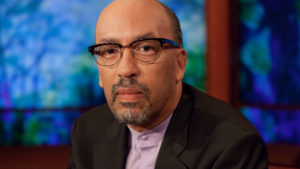
Bill Fletcher Jr.
Although Fletcher is positive about the prospects of an African Union with unity comparable to the EU if not greater, he identifies possible pitfalls.
“Xenophobia and protectionism are a major threat. The critical thing is in order for this to work, there has to be an economic development program, and I don’t think starting with free trade is a winner,” he warned. “When you look at what happened in South Africa in 1995 and ’96, when they dropped the tariff barrier, there was a massive desertion by industry, especially textiles, and it had a consequence on Durban and Cape Town. For Lesotho, Mozambique and Swaziland it provided employment in those countries but had devastating consequences in South Africa, because the companies went where there was cheaper labor and fewer restrictions” Fletcher added.
Meanwhile, there is the issue of China and its vast investments on the African continent. The Asian powerhouse, like any number of companies or sovereign countries seeking to do business in Africa, could benefit from a united Africa.
“Presumably, given the fair amount of investment the Chinese already have on the continent, they probably stand to gain more from this. But this is also, I think, why it is necessary to have so many other American firms engaging more heavily on the continent, to help diminish the first mover advantage the Chinese have in a number of areas, and start engaging them in a much more aggressive manner economically on the continent,” he said.
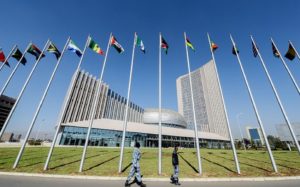
The AU headquarters in Addis Ababa, Ethiopia
“You have competition for resources once you have China there. But the deeper problem is these nations remain resource dependent. It’s not as if you have balanced economies,” Fletcher said. “Take the D.R.C. [Democratic Republic of the Congo]. The D.R.C. is one of the richest countries in the world mineral wise, and it is one of the poorest countries in the world when you talk about income. It barely has a state infrastructure, it doesn’t have an economic plan, they have all this wealth and are being raped by all these countries. What happened in the D.R.C. civil war is it devolved…and became a squabble where different countries competed over resources and became the gendarmes for multinational corporations,” he suggested.
Fletcher also offered that China is sought after by repressive regimes.
“The Chinese don’t bother with the pretense of human rights abuses, they believe in non-intervention in the internal affairs of another country. They’ll strike a deal if the terms are right,” he said. “That doesn’t mean other countries are morally superior; it just means they are hypocritical.”
“The problem is the dominant economic system on the planet in neo-liberalism. If you remove trade barriers between these very uncompetitive countries, what are you doing about the economic development of these impoverished economic regions? That’s where a regional economic plan is necessary and engages people and not just experts,” Fletcher concluded.
